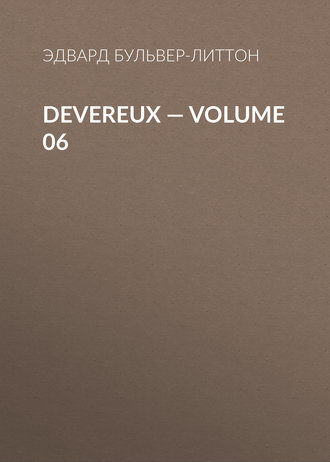 полная версия
полная версияDevereux — Volume 06
3
I need scarcely remind the reader that Lord Bolingbroke, though he had received a full pardon, was forbidden to resume his seat in the House of Lords.—ED.
4
T am not ashamed to say to you that I admire her more every hour of my life.—Letter from Lord Bolingbroke to Swift.
Bolingbroke loved her to the last; and perhaps it is just to a man so celebrated for his gallantries to add that this beautiful and accomplished woman seems to have admired and esteemed as much as she loved him.—ED.
5
She was brought up at St. Cyr.—ED.
6
In this letter Swift adds, "I should be ashamed to say this if you [Lord Bolingbroke] had not a spirit fitter to bear your own misfortunes than I have to think of them;" and this is true. Nothing can be more striking, or more honourable to Lord Bolingbroke, than the contrast between Swift's letters and that nobleman's upon the subject of their mutual disappointments. I especially note the contrast, because it has been so grievously the cant of Lord Bolingbroke's decriers to represent his affection for retirement as hollow, and his resignation in adversity as a boast rather than a fact. Now I will challenge any one /thoroughly/ and dispassionately to examine what is left to us of the life of this great man, and after having done so, to select from all modern history an example of one who, in the prime of life and height of ambition, ever passed from a very active and exciting career into retirement and disgrace, and bore the change—long, bitter, and permanent as it was—with a greater and more thoroughly sustained magnanimity than did Lord Bolingbroke. He has been reproached for taking part in political contests in the midst of his praises and "affected enjoyment" of retirement; and this, made matter of reproach, is exactly the subject on which he seems to me the /most/ worthy of praise. For, putting aside all motives for action, on the purity of which men are generally incredulous, as a hatred to ill government (an antipathy wonderfully strong in wise men, and wonderfully weak in fools), the honest impulse of the citizen, and the better and higher sentiment, to which Bolingbroke appeared peculiarly alive, of affection to mankind,—putting these utterly aside,—it must be owned that resignation is the more noble in proportion as it is the less passive; that retirement is only a morbid selfishness if it prohibit exertions for others; that it is only really dignified and noble when it is the shade whence issue the oracles that are to instruct mankind; and that retirement of this nature is the sole seclusion which a good and wise man will covet or commend. The very philosophy which makes such a man seek the /quiet/, makes him eschew the /inutility/ of the hermitage. Very little praiseworthy to me would have seemed Lord Bolingbroke among his haymakers and ploughmen, if among haymakers and ploughmen he had looked with an indifferent eye upon a profligate Minister and a venal parliament; very little interest in my eyes would have attached itself to his beans and vetches, had beans and vetches caused him to forget that if he was happier in a farm, he could be more useful in a senate, and made him forego, in the sphere of a bailiff, all care for re-entering that of a legislator.—ED.
7
Thus very inadequately translated by Pope (see his Letter to Edward Blount, Esq., descriptive of his grotto):—
"Nymph of the grot, these sacred springs I keep, And to the murmur of these waters sleep: Ah, spare my slumbers; gently tread the cave, And drink in silence, or in silence lave."It is, however, quite impossible to convey to an unlearned reader the exquisite and spirit-like beauty of the Latin verses.—ED.
8
Pope seems to have been rather capricious in this respect; but in general he must be considered open to the sarcasm of displaying the bounteous host to those who did not want a dinner, and the niggard to those who did.—ED.
9
This beautiful sentiment is to be found, with very slight alteration, in a letter from Bolingbroke to Swift.—ED.









